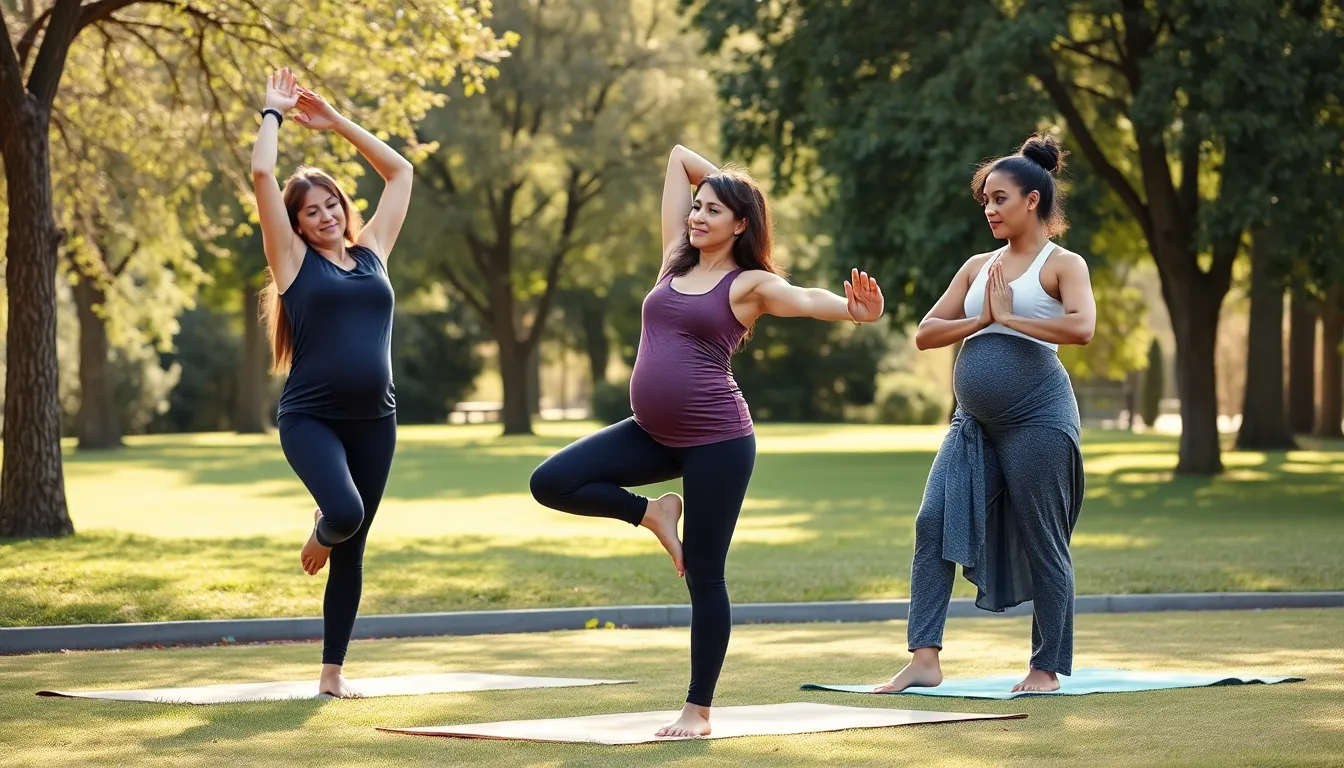After nine months of nurturing a tiny human, the last thing on a new mom’s mind might be breaking a sweat. But postpartum recovery exercise isn’t just about fitting into those pre-pregnancy jeans; it’s about reclaiming strength, energy, and a sense of self. Who knew that a little movement could be the superhero cape every mom needs?
Table of Contents
ToggleUnderstanding Postpartum Recovery Exercise
Postpartum recovery exercise plays a crucial role in a new mother’s healing process. Engaging in appropriate physical activity can significantly enhance both physical and mental well-being during this transformative period.
Importance of Postpartum Recovery
Postpartum recovery focuses on restoring strength, improving mobility, and addressing physical changes following childbirth. Engaging in recovery exercises fosters better posture, reduces discomfort, and alleviates symptoms related to diastasis recti or pelvic floor issues. Recognizing the importance of personalized exercise routines can aid in addressing unique needs, facilitating a smoother transition into motherhood.
Benefits of Regular Exercise
Regular exercise offers numerous advantages for new mothers. Physical activity boosts energy levels, combats fatigue, and improves mood through the release of endorphins. It aids in weight management and promotes better sleep quality. Additionally, engaging in social activities, such as group classes or outdoor walks, fosters connections with other mothers, enhancing emotional support and overall happiness. Regular exercise not only physicalizes recovery but cultivates a sense of empowerment during motherhood.
Types of Postpartum Recovery Exercises

Postpartum recovery exercises encompass various activities that cater to the unique needs of new mothers. These exercises aid in regaining strength and enhancing well-being during the recovery phase.
Gentle Activities
Gentle activities help new mothers ease back into exercise. Walking offers low-impact movement that elevates heart rate gradually. Stretching improves flexibility and helps relieve tension in the body. Postnatal yoga encourages mindfulness while promoting core stability and pelvic floor engagement. Short, frequent sessions allow mothers to fit exercise into their busy schedules, fostering a sense of accomplishment without overexertion.
Strength Training
Strength training plays a crucial role in postpartum recovery. Bodyweight exercises, such as squats and lunges, strengthen key muscle groups while minimizing injury risk. Resistance bands offer a versatile option for muscle toning, targeting arms, hips, and legs effectively. Incorporating core-strengthening exercises, like planks and bridges, enhances stability and supports recovery from common issues like diastasis recti. Structured strength routines empower mothers, helping them regain confidence and vitality.
Creating a Postpartum Exercise Plan
Creating a postpartum exercise plan begins with understanding individual needs and circumstances. Tailoring the plan ensures an effective and supportive approach to recovery.
Assessing Your Readiness
Assessing readiness for postpartum exercise involves consulting with healthcare providers. New mothers should evaluate physical and emotional well-being before starting any exercise regimen. Factors to consider include the type of delivery, recovery from complications, and overall energy levels. Listen to the body’s signals; pain or excessive fatigue indicates a need for more recovery time. Gentle activities, such as short walks or stretching, can gauge comfort levels. Seeking guidance from a qualified fitness expert who specializes in postpartum recovery strengthens the process.
Setting Realistic Goals
Setting realistic goals focuses on gradual progress rather than immediate results. New mothers should define clear, measurable, and attainable objectives that align with their recovery journey. For example, aiming for 10-15 minutes of activity per day can foster consistency without overwhelming the body. Prioritizing enjoyment in activities boosts adherence, whether it’s yoga, walking, or strength training. Monitoring progress and celebrating small achievements reinforces motivation and encourages perseverance. A structured yet flexible approach accommodates changing needs during recovery, ensuring a positive experience overall.
Tips for a Safe Postpartum Workout
Postpartum recovery exercise requires attention to safety and individual needs. New mothers should prioritize mindful practices to ensure effective and enjoyable workouts.
Listening to Your Body
Listening to the body’s cues is essential during postpartum recovery. Fatigue, pain, or discomfort signals the need for modification or rest. Each mother’s healing journey is unique; hence, starting slow with gentle movements helps assess tolerance. Gradually increasing intensity and duration supports gradual improvements. Engaging in exercises like walking or stretching fosters awareness of the body’s response. Heeding signs of overexertion, such as increased heart rate or persistence of pain, prevents injuries and aids recovery.
Staying Hydrated and Nourished
Staying hydrated and nourished plays a critical role in postpartum recovery. Adequate fluid intake helps maintain energy levels and supports breastfeeding. Mothers should aim for at least 8-10 glasses of water daily. A balanced diet rich in whole foods, lean proteins, fruits, and vegetables ensures adequate nutrient intake for recovery and energy. Healthy snacks, such as nuts and yogurt, can provide quick boosts during busy days. Prioritizing nutrition enhances overall well-being and promotes better workout performance.
Postpartum recovery exercise plays a pivotal role in helping new mothers navigate the challenges that come with motherhood. By focusing on gentle movements and strength-building activities, they can reclaim their physical health and emotional well-being. Emphasizing the importance of listening to their bodies and setting achievable goals fosters a positive mindset during this transformative time.
With the right approach and support, new moms can not only enhance their recovery but also cultivate a sense of empowerment and community. Embracing this journey will lead to a healthier lifestyle and a more fulfilling motherhood experience.






